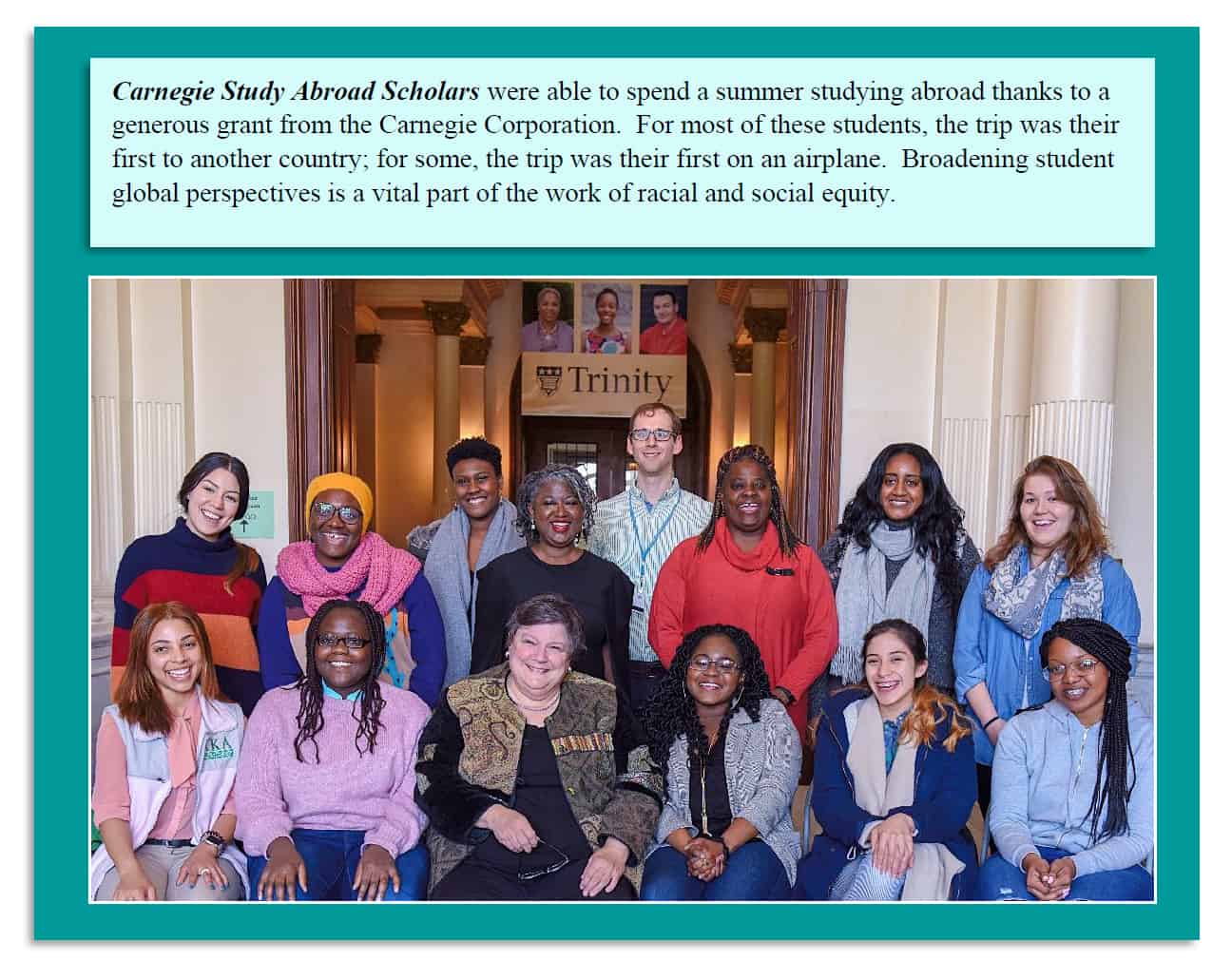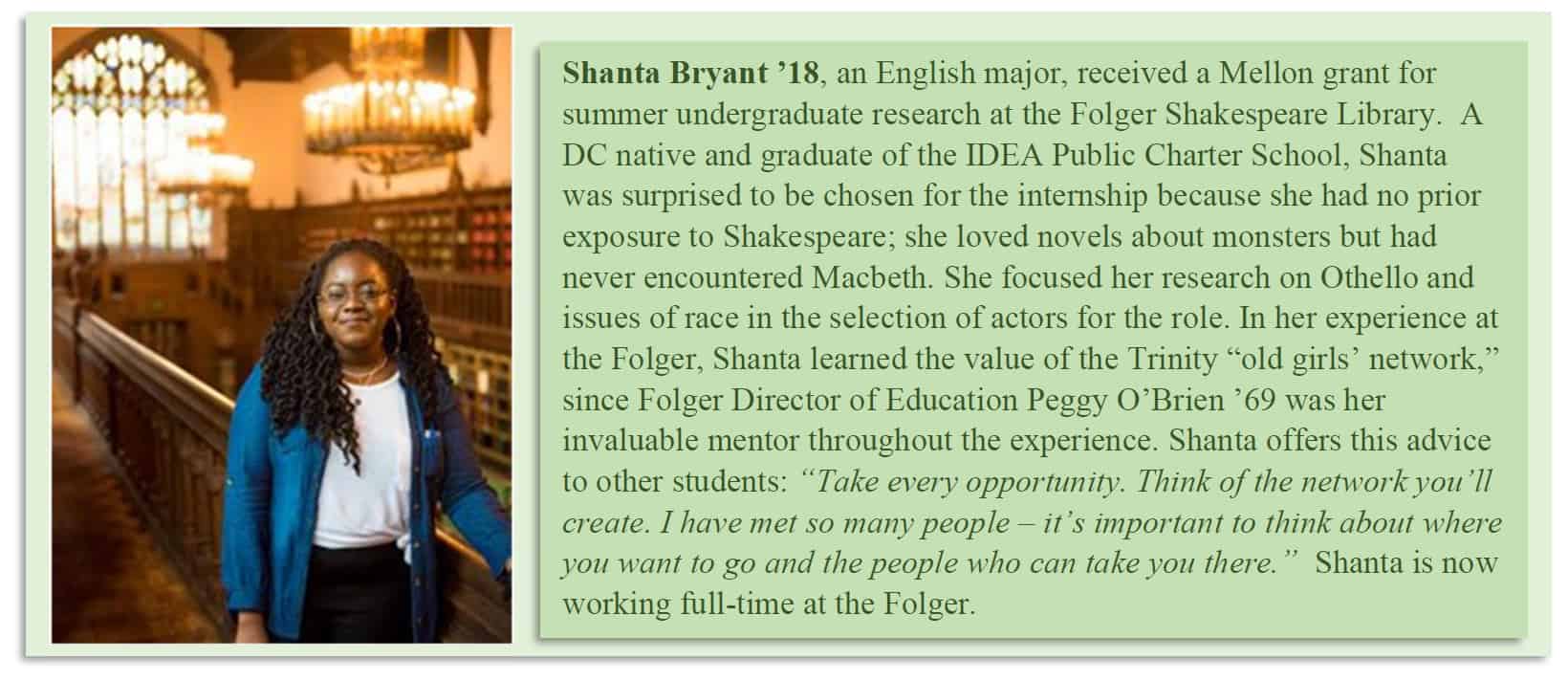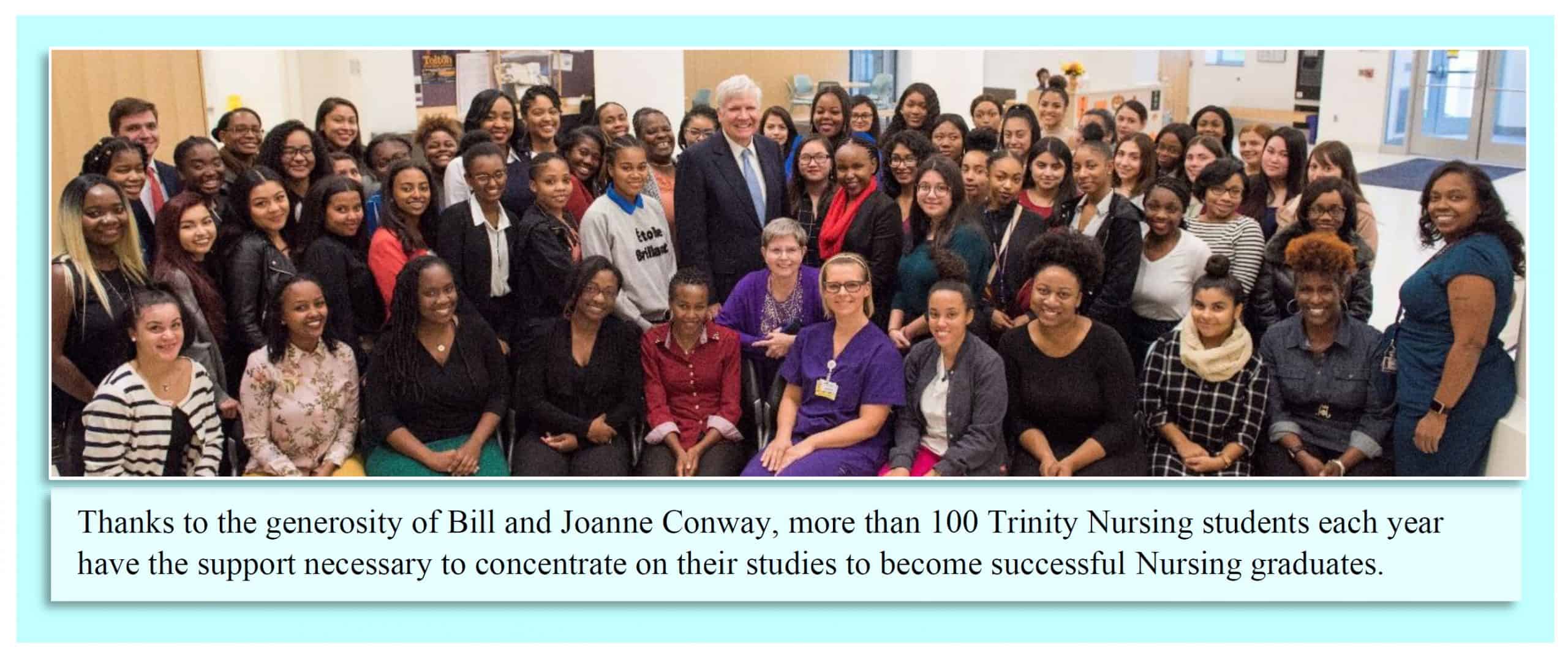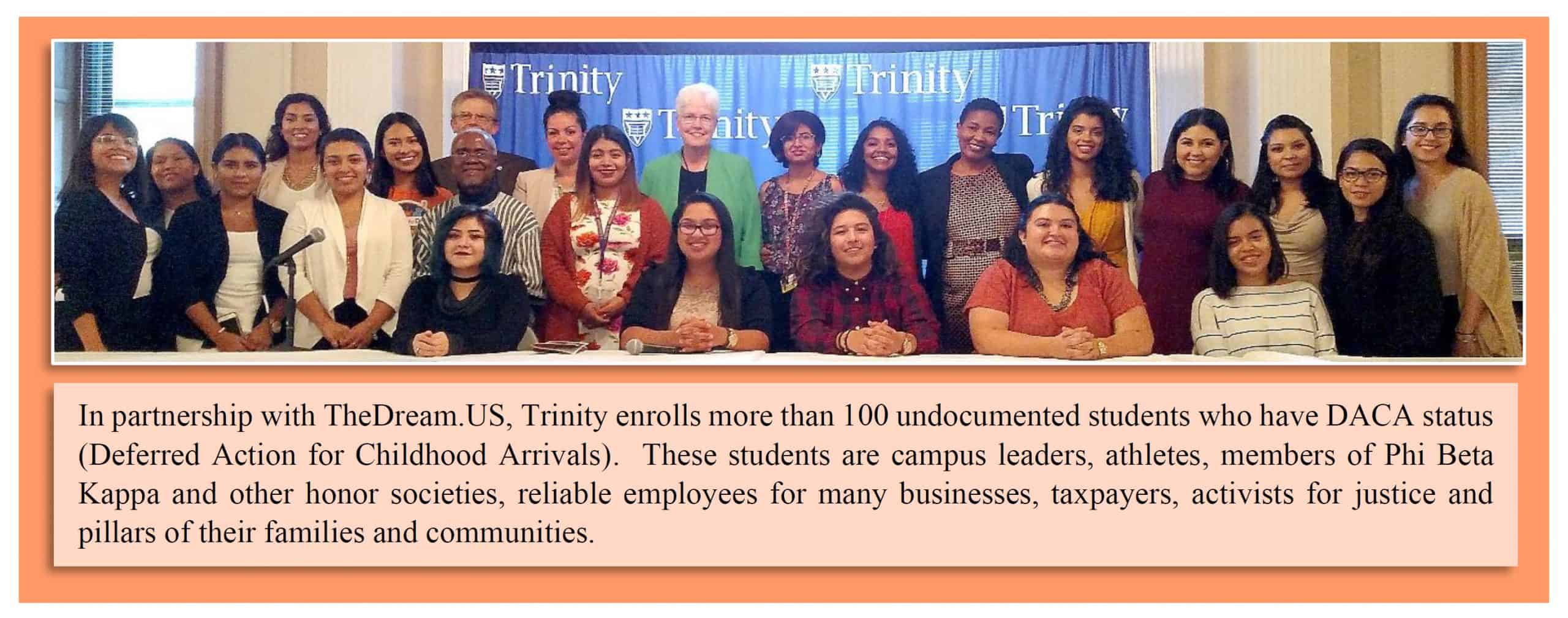
Trinity DARE reflects Trinity’s significant leadership in promoting racial equity particularly for students in the Washington region. More than 80% of Trinity’s students reside in the District of Columbia, Maryland and Virginia, with fully half from D.C. Trinity serves more D.C. residents than any private university in the nation.
Demographics: Trinity’s student body in 2020 includes about 95% persons of color, including about 65% Black/African American and 30% Latina/Hispanic. Trinity is classified by the U.S. Department of Education as a Minority Serving Institution (MSI) and a Predominantly Black Institution (PBI) and, more recently, as an emerging Hispanic Serving Institution (HSI). 94% of Trinity students are women, reflecting the university’s historic and ongoing commitment to women’s education. About 80% of full-time undergraduates are eligible for Pell Grants, with a median family income of just about $25,000. Slightly more than 100 Trinity students are undocumented immigrants. A majority of Trinity’s full-time faculty are scholars of color including 46% African American. A majority of Trinity’s adjunct faculty are African American as well as a majority of all staff.
Initiatives and Funding for Equity Projects 2015-2020:
As evidence of Trinity’s leadership, Trinity has received numerous gifts and grants to support projects that shape the university’s ability to promote racial equity. Trinity DARE seeks to ensure continuing funding for these initiatives:
- Predominantly Black Institutions Grant, U.S. Department of Education: as of Fiscal 2021, Trinity will have received nearly $3 million from USDE for the PBI program which has the specific purpose to prepare Black Americans for careers in professions where they are under-represented, particularly in Nursing and STEM disciplines. This grant also supports Trinity’s partnership with the D.C. Public Schools to create the Early College Academy with Coolidge High School to improve the ability of D.C. students to achieve college degrees.
- Inclusive Excellence Grant through the Howard Hughes Medical Institute (HHMI): The five-year $1 million HHMI grant supports transformation of science pedagogy using inclusive excellence principles with the goal of supporting more low-income women of color to enroll and persist in science majors.
- The Henry Luce Foundation awarded Trinity a $50,000 grant in 2020 to promote the inclusive excellence results of the HHMI program.
- Clare Boothe Luce Program: Trinity is a designated beneficiary of the will of Clare Boothe Luce, administered through the Henry Luce Foundation, providing annual support for women students and faculty in STEM.
- Undergraduate Research: Led by Clare Boothe Luce Professor Dr. Patrice Moss, and building on the work of the HHMI inclusive excellence program, Trinity science faculty have developed an extensive range of opportunities for students to engage in undergraduate research, including annual participation in ABRCMS (Annual Biomedical Research Conference for Minority Students) where Trinity science majors present research and have won awards as well as the UMBC (University of Maryland Baltimore County) annual undergraduate research program.
- NASA Grant: Led by Chemistry Professor Dr. Shizuka Hsieh, Trinity also participates in a NASA grant through American University that supports undergraduate research projects and summer internships for science majors.

- Mellon Foundation Programs: The Mellon Foundation has provided three major grants to Trinity that support inclusive excellence pedagogy and opportunities for students in Arts & Humanities disciplines:
- Two Mellon grants have provided support for curricular development, research and internships to open new pathways for students of color in the liberal arts. As one example, a student’s research project on Blackness in Shakespeare led her to take a professional position at the Folger Shakespeare Library.
- The Trinity Global Leadership Initiative (TGLI) is a Mellon-funded project that aims to create a distinctive focus on global affairs. One of the key initiatives of TGLI is the examination of global issues of race and racism. Through TGLI, Trinity is working with the Center for Strategic and International Studies to introduce students of color to careers in diplomacy and foreign affairs.
- Carnegie Academic Leadership Grant: With a $500,000 grant from the Carnegie Corporation in recognition of Trinity’s academic leadership in the education of low-income students of color, Trinity was able to strengthen academic advising and student success initiatives, as well as support faculty projects across a range of disciplines.
- Adverse Childhood Experiences: The Carnegie grant funded a project of the Counseling faculty focusing on childhood trauma in the District of Columbia, leading to a major colloquium and presentation of research papers funded in part by Kaiser Permanente.

- Conway Scholars Program: Through the generosity of William and Joanne Conway and their Bedford Falls Foundation, Trinity has received and will continue to receive for the next five years gifts totaling more than $10 million to support more than 100 Nursing students annually. Black and Latina nurses comprise fewer than 10% and 5% of the nursing profession respectively; Trinity graduates in nursing are already changing the face of the nursing workforce locally, and the support of the Conway Scholars Program has been essential to ensure their success. This program is an example of how a private benefactor can create scholarships to pipeline Trinity students directly into a profession where Black and Latina professionals are historically under-represented.
- Partnership with MedStar, Children’s National Hospital and other area healthcare providers: Trinity has entered a formal academic partnership with MedStar Health to expand the range of Nursing clinical opportunities in the MedStar system and to ensure employment opportunities for Trinity graduates to work in communities where MedStar provides services. Trinity has a strong clinical partnership with Children’s National Hospital and also works closely with all hospitals and healthcare providers in the Washington region.
- Partnership with Schools, DC-CAP and DC-TAG: Trinity has partnered with the D.C. Public Schools and Coolidge High School to create the Early College Academy at Coolidge. Trinity offers dual enrollment courses for students in many public, charter and private schools, and provides extensive professional development opportunities for teachers and principals through the continuing education program. Trinity also is pleased to be one of the largest university participants in the D.C. College Access Program and D.C. Tuition Assistance Grant Program.

- Partnership with TheDream.US: Since 2014, Trinity has been a partner with TheDream.US, the major funder of scholarships for undocumented college students in the U.S. Trinity DARE will seek additional funding to support students who face considerable discrimination due to their immigration status.
- Faculty grants: Faculty have also received grants for their research related to issues in racial equity:
-
- Mr. Vernon Scott, Criminal Justice, received a grant from the Department of Homeland Security to conduct research on community factors that contribute to strained relations with police and that may impact a police officer’s susceptibility to commit violence;
- Dr. Wairimu Mwangi, Sociology, has participated in the COMRADE (Congruent Mentorship to Achieve Academic Diversity in Neuroscience) program at NYU and as a result of that experience she has received a grant from the National Institutes of Health for a project examining comorbidities in HIV-positive women.
-
- Dr. Kimberly Monroe, Global Affairs, a cultural historian focused on the African diaspora, received a CAORC fellowship (Council of American Overseas Research Centers) to participate in an intensive faculty development program in Senegal to support her course development at Trinity.
-
- Dr. Shizuka Hsieh, Chemistry, with Dr. Patrice Moss and Dr. Karobi Moitra, Biology, and other science faculty leveraged an NIFS (NASA Internships, Fellowships, and Scholarships) grant at Trinity to promote strong mentoring, establish effective collaborations with community partners, and coordinate undergraduate women’s competitive mentored internships and authentic research opportunities at institutions including Children’s National Research Center, University of Maryland labs, Howard University labs, and the Genetic Alliance. The grant also brought together Trinity’s diverse STEM faculty and K-12 teachers in DC high schools to learn best practices in course design and revision, mentorship, classroom teaching strategies, and strengthen the K-12 to college STEM pipeline predominantly for women of color.
-
- Dr. Hsieh also received a National Science Foundation SENCER (Science Education for New Civic Engagements and Responsibilities grant to engage cross-disciplinary faculty from business, mathematics, ethics, and additional disciplines to teach STEAM courses in the context of civic issues, societal problems, and active contributions to the community. Trinity’s grant enabled student participation in environmental justice analyses and initiatives.
-
- Dr. Elizabeth Child, English, collaborated with the American Association of Colleges and Universities (AAC&U) to edit a major report Culturally Responsive Strategies for Reforming STEM Higher Education: Turning the TIDES on Inequity.

Go to Resource Requirements and Funding Opportunities
OR
Return to Trinity DARE home page